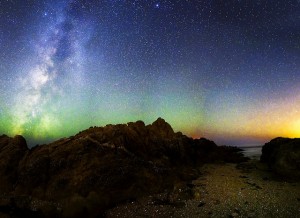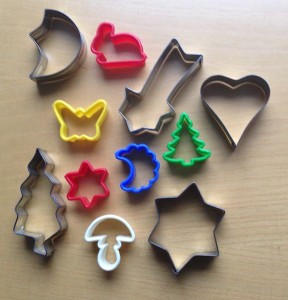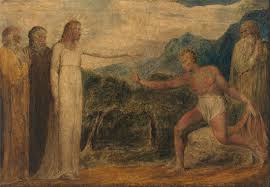I suppose I’d also come looking for some way to wait in my own darkness, to turn it into the kind of dark night that could incubate newness. Darkness remains deadening and nontransforming – like the tomb – unless we learn how to turn it into a creative and life-giving experience. – Sue Monk Kidd
I’ve been blogging my way through Sue Monk Kidd’s book on midlife. (Earlier installments in this series can be found here.) Chapter 7, entitled “Incubating The Darkness”, addresses what St. John of the Cross famously called the dark night of the soul.* Sue Monk Kidd explains, “God guides us the long way round. And sometimes that means winding through a dark wood. It doesn’t mean we’re lost, however. The darkness is a part of the trip. Too many of us panic in the dark. We don’t understand that it’s a holy dark and that the idea is to surrender to it and journey through the real light.”
 Midlife’s changes can include depression. It did for me, and I found myself sitting in a counselor’s chair as I worked through the wet, thick hopelessness that blanketed my days and disrupted my nights. Though the dark night of the soul may overlap with clinical depression, the two are not identical. “In the…darkness, God often seems absent,” she explains. “We begin to encounter Deus absconditis – the sense that God is playing hide and seek. I believe that what we’re experiencing, however, is the hiding of an old way of knowing and experiencing God, the crumbling of our ‘creation’ of who God is and the divine system that our egos have invested in.”
Midlife’s changes can include depression. It did for me, and I found myself sitting in a counselor’s chair as I worked through the wet, thick hopelessness that blanketed my days and disrupted my nights. Though the dark night of the soul may overlap with clinical depression, the two are not identical. “In the…darkness, God often seems absent,” she explains. “We begin to encounter Deus absconditis – the sense that God is playing hide and seek. I believe that what we’re experiencing, however, is the hiding of an old way of knowing and experiencing God, the crumbling of our ‘creation’ of who God is and the divine system that our egos have invested in.”
The dark night experience isn’t limited to midlife, though it certainly is a mile marker on the journey for many of us. This kind of darkness is a reminder that we can not go back to an earlier version of our lives or our belief system. It is a gift, but it is the kind of gift that can only be received fully in retrospect. Once we begin to discern that we may have entered a dark night of our soul and discover that there is no way out except to move through it, we can learn to work with it rather than fear or attempt to flee it. Kidd writes,
One way we coax the life of the new self is by living the questions that inhabit our dark night, by dwelling creatively with the unresolved inside us.
I lived with questions about who I had been and who I was becoming, and about whether the growth was worth the pain, risk, and upheaval. I lived with questions about how to adopt parts of myself I had orphaned, how to heal old wounds, how to relate to an expanding vision of God and the world.
I didn’t like the disorder and anxiety the questions produced, and I didn’t like the unknowing…
Jesus was a master at using questions to pull people into self-confrontation and growth. ‘What are you looking for?’ ‘Do you want to get well?’ ‘Who do you say that I am?’ ‘Why do you not understand what I say?’ ‘Do you love me?’ The New Testament is full of them.
Most of us aren’t comfortable living with the tension of unresolved questions. “We’re more apt to try to quell the conflict by banishing the unwanted side of the opposites,” she notes. Maybe not so coincidentally, I’ve discovered I have the clearest view of the upside-down, inside-out kingdom of God in the tensions. Those tensions, improbable and impossible, are where a word moves a mountain. And those unresolved questions tend to push us forward, further into the dark.
God intends those dark nights of the soul to “burn us clean”, in contrast with neurotic suffering which is marked by self-pity and despair. King David reminds us that even the darkness is not dark to God: “If I say, ‘Surely the darkness will hide me and the light become night around me,’ even the darkness will not be dark to you; the night will shine like the day, for darkness is as light to you.” (Ps. 139:11, 12) He is there in the darkness with us. Kidd writes, “When we’re knocked off our feet by pain, the welts raised upon our soul are experienced by God, who is closer than our own skin.”
It might be hard to believe in the darkness, but this is indeed what the dark night of the soul can teach us if we’re willing to cooperate with it. If we’ve been through it and found ourselves on the other side of it, the best gift we can give to others experiencing this facet of spiritual life is to orient them to it by sharing our experience. Our well-meaning tendency to try to fix it, which is often rooted in our own discomfort with the darkness, can short-circuit what God is actually doing in someone else’s life.
If you’ve ever experienced a dark night of the soul, what or who helped orient you to what was happening?
* If you’re looking to do additional exploration on this and related topics, you can read St. John’s work here. I also recommend Marlena Graves’ A Beautiful Disaster and Kathleen Norris’ Acedia and Me.
Image via Creative Commons 2.0 search/Flickr











